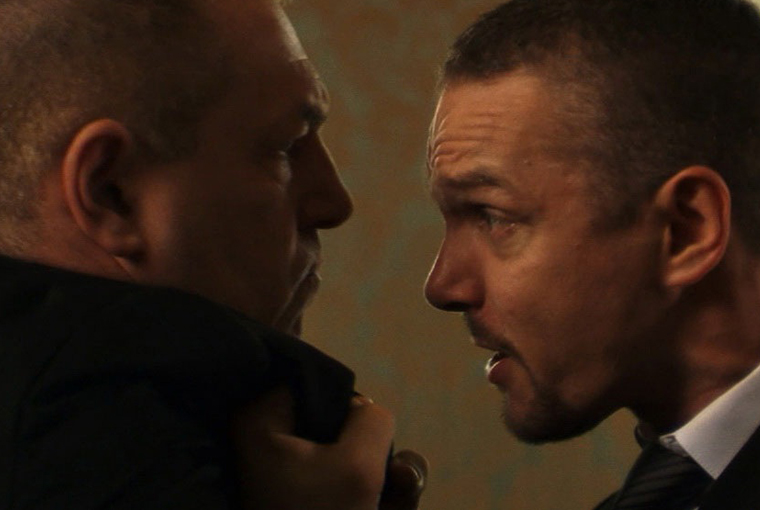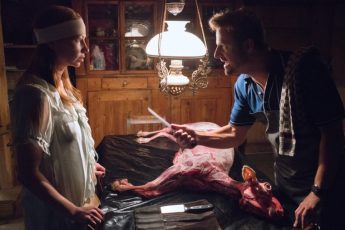Soviet Nostalgia
Svetlana Baskova’s For Marx… (Za Marksa…, 2012)
Vol. 27 (March 2013) by Konstanty Kuzma
A cold and colorless morning in a grim town in Russia: employees of a steel factory discuss their poor working conditions as a bus carries them to work. The take, which lasts for minutes, moves skillfully from one end of the bus to the other, accompanying the many talkative passengers on their bumpy ride – a beautiful and well-executed shot that, as we have seen often in recent Russian cinema, gives observation precedence over action. But the quality of this promising opening sequence of For Marx… is soon forgotten as the film moves from mockumentary realism to telenovela dramatism. Interested in the activities of labor unions in the wake of the financial crisis, director Svetlana Baskova paints a caricatural picture of the country that – while capturing the division of Russian society – ultimately loops dramatic and social clichés to coast along its thin narrative.
Baskova’s universe is neurotic. Objects break or land on the floor, a unionist falls off a chair, another one trips. The actors – overall surprisingly weak for Russian standards -, struggle to deliver the visibly strict script which feels flat and inorganic. In the end, this is a logical consequence of Baskova’s ideological project. Baskova sets out to illustrate the difficult position Russian unionists are in, and it shows that she didn’t give much importance to developing a plot interesting enough to match the project. Its political grounding, the evident premise of the film, thus also constitutes the movie’s greatest weakness: all elements, from posters over conversations exchanged after work, ultimately fulfill the purpose of juxtaposing the world of the unionists (honest, modest, intellectual) and that of the factory owners (unscrupolous, corrupted, bourgeois); the former try to form a platform to represent their interests, the latter undermine these attempts with all means thinkable. Perhaps, this is why the mass scenes are so convincing: here, the lifeless dialogues disappear in the noise of the crowd, while the creditable location scouting and gray-toned camera work (Maksim Moskin, Egor Antonov) creates a gloomy post-Soviet atmosphere. Still, it is likewise the political grounding and Baskova’s sympathetic stance towards unionists that will continue to trigger positive responses in and outside of Russia. As we’ve previously discussed in this journal, political films can often make up for the lack of artistic quality by getting the right sort of message across (another example is Little Moscow, an unimaginative, mainstream film building on Poland’s skepticism of socialism).
In Western media, the Russian opposition – which has gained momentum since the street protests against the Duma election in late 2011 – has often been portrayed in the light of its young, urban members. Many well-educated people too young to remember “better times” seem to have turned away from their government, either by emigrating, or by speaking up through social media, art, and direct political action. Undoubtedly, this is true in part, but For Marx… presents us with a wholly different picture: Baskova and her film stand for a social class which reminisces its own past rather than dreaming of a Western-inspired future. While sharing the frustration of their younger peers, many older people prefer the Soviet reality they grew up with over a system that has brought chaos to the ex-Soviet region. To them, capitalism is like a false promise, a delusional dream which only exists in the false reality of Hollywood movies and American TV shows. But where they have grasped quickly what capitalism is capable of (in Russia, the chaotic post-Soviet privatizations and wide-spread corruption have dramatised inequality, monopolization and economic exploitation – market economy’s typical by-products), their nostalgia has created an image of the Soviet past that is just as misguided as the one of capitalism they are so keen on parodising. This explains why Baskova’s all but abstinent factory workers seem to spend all of their free time discussing history, literature, art and cinema: they’re characters, not real people. If they were really representative of Soviet-educated factory workers (or any sane person whatsoever), Baskova’s film would hardly need to build on a crystal clear plot, black-and-white characters, and unanmbiguous dialogue. Baskova pretends to take unionists to be wunderkinds who are capable of combining their strenuous, time-consuming work with a fully-fledged Soviet intellectual education, when her film shows how little confidence she really has in viewers understanding her programmatic address.




Excellent and fair review. The film starts well, and then descends rapidly into cliched characters and unconvincing narrative, with some ‘artistic’ shots frown in to make it look ‘cutting edge’. The film appears to be an excuse to put a confused political message forward, with little consideration for plot – as the reviewer points out. The grim factory scenes are impressive, visually, unlike most of the film. The ending is outright silly.
Women are almost entirely absent in the this film, and some scenes border on the ridiculous in the absence of females and younger people. For example, the absurd funeral scene, in which one is left to presume that the the younger person who died has no friends or family of his own age, and neither he or the other fellow knew any women other than their mothers, for the only people to attend are the handful of unionists we’ve already scene and some grief-stricken mothers of an earlier age.
The silly speech about Hollywood and Brecht was an awkward and pointless scene, that at best was pretentious.
I found it disappointing, given its potential to explore an interesting and relevant area of human / political drama.